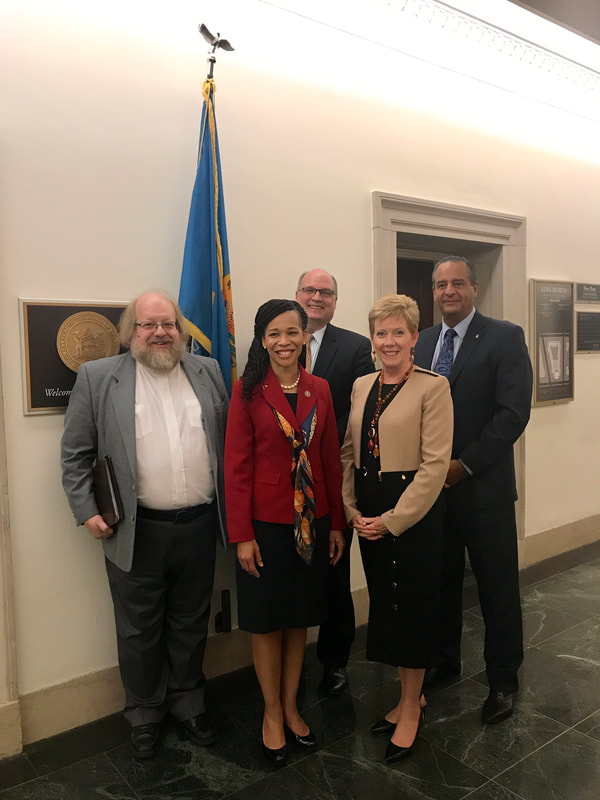|
by James DeChene
Two articles were printed highlighting two sides of the same coin on Delaware’s budget and economy. The first states that while Delaware’s unemployment rate is holding steady at 4.7%, we are struggling compared to the rest of the nation. Not only that, but our job creation pace slowing, with a sluggish growth rate of less than .1%. The other story was of the purchase of the Hercules building in Wilmington for a third of its mortgage note, at $22.3 million (the note was $65 million). That was for a building with a roughly 50% occupancy level. This adds to the growing pool of available, and unused, office space in Wilmington. This paints a fairly bleak picture of Delaware’s overall recovery and what the budget will look like next year. Work on the public private partnership (P3), also known as the Delaware Prosperity Partnership (DPP), to reorganize DEDO continues, with next steps including the Governor naming board members. The hope is to have the organization up and running by the end of the year. The first Ecological Extinction Taskforce met this week. Attendees heard a presentation from UD professor Dr. Doug Tallamy on the reduction of a number of Delaware species. The next meeting is August 7.
0 Comments
by Mark DiMaio
We Work for Health Delaware (WWFH) is a grassroots initiative to illustrate how biopharmaceutical and medical innovation work together to create a strong and vibrant economy. WWFH Delaware brings together business, labor and community partners seeking to raise awareness about the vital role biomedical research plays in delivering life-saving technology, as well as well-paying jobs. We Work for Health Delaware took to Capitol Hill this week to meet with the Delaware Federal delegation to discuss renewing the Prescription Drug User Fee Act (PDUFA); elimination of the Medicare Independent Payment Advisory Board (IPAB); and maintaining a non-interference clause in the Medicare Part D drug program. WWFH Delaware also stressed the importance of keeping Delaware in the forefront of biopharma innovation as a driver of economic development and well-paying jobs for the state. The WWFH Delaware delegation was comprised of Reverend Robert Hall, Executive Director, Delaware Ecumenical Council on Children & Families; James Maravelias, President, Delaware AFL-CIO & WWFH Delaware Co-Chair; Helen Stimson, President, Delaware BioScience Association & WWFH Delaware Co-Chair; and Mark DiMaio, Director of Grassroots & Research, Delaware State Chamber of Commerce. The group met with Senator Carper, Senator Coons and Congresswoman Blount-Rochester and their staffs to discuss WWFH’s key issues and how elected leaders have a direct impact on policies that help Delaware’s research and development organizations prosper. by James DeChene
As widely reported, the FY2018 budget passed with a mix of new revenue and a number of expenditure cuts and other reductions. The ratio was about 48% new revenue ($182.7 million) and 52% cuts ($195.1 million), roughly meeting Governor Carney’s goal of a 50-50 split to fill a budget gap of $377.8 million. The new revenues are fairly easy to account for: increasing the corporate franchise tax ($116.1 million), raising the alcohol excise tax ($5.2 million), raising the tax on tobacco products ($11.9 million), and raising the realty transfer tax ($45.6 million), changes to insurance policy charges ($4.6 million) and one-time special funds ($3 million). Tax cuts, and reductions of proposed increases, came from, among other things:
Simply put, nothing contained in the revenue package is designed to be a fix for Delaware’s structural issues, and the list of funding issues the state faced this year only increase next year, including:
The Delaware State Chamber of Commerce believes in the time available between now and the end of 2017 should be focused on discussions and planning on how to address these issues in the next part of legislative session. Waiting to solve budget crises with a complicated series of steps, such as the removal of itemized deductions, or looking for new, last minute, sources of revenue makes for ill-formed policy. The ability to have in-depth discussions regarding the impacts of tax increases and spending cuts will go a long way to helping set Delaware on a path to prosperity. by James DeChene
The General Assembly finished out, for the first time, in what is called “extraordinary session” early Monday morning by passing a budget, a revenue package to pay for it, grants-in-aid, and the bond bill. Some of the highlights from the last few days in Dover include:
Also of note was the passage of a number of State Chamber priorities, which provides good news for our members. They include:
An important item to note: None of these increases are structural changes or work to address Delaware’s long term revenue and spending issues. Many of the same issues the General Assembly faced this year remain, with the added complication of next year being an election year. It remains to be seen the impact this year will have on future budgets, but the expectation at this point is that next year will be another painful year. |
Archives
July 2024
Categories
All
|
|
Copyright Delaware State Chamber of Commerce, Inc.
All Rights Reserved. PO Box 671 | Wilmington DE 19899 (302) 655-7221 | [email protected] | sitemap |
|


 RSS Feed
RSS Feed